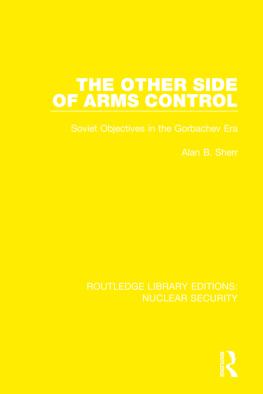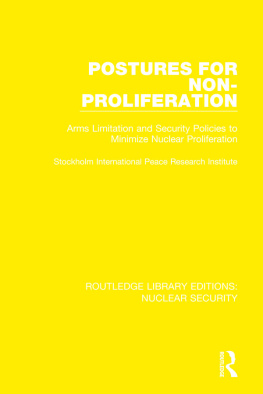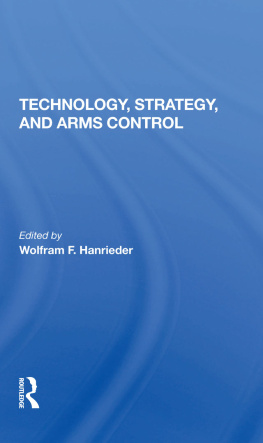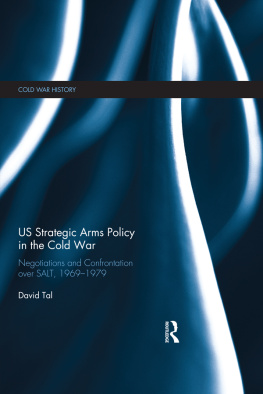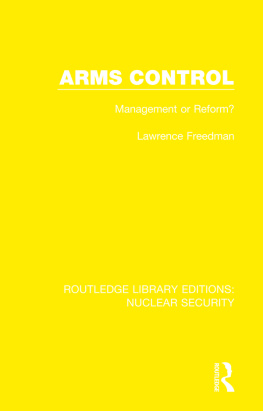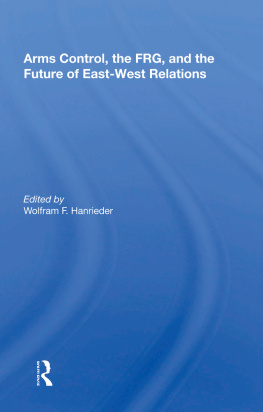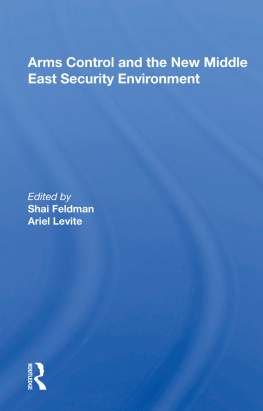Arms Control and Defense Postures in the 1980s
Also of Interest
The Soviet Union in World Politics, edited by Kurt London
The Soviet Union in the Third World: Successes and Failures, edited by Robert H. Donaldson
The Domestic Context of Soviet Foreign Policy, edited by Seweryn Bialer
NATOThe Next Thirty Years: The Changing Political, Economic, and Military Setting, edited by Kenneth A. Myers
Eastern Europe in the 1980s, edited by Stephen Fischer-Galati
Available in hardcover and paperback.
About the Book and Editor
Arms Control and Defense Postures in the 1980s edited by Richard Burt
The current standstill in U.S.-Soviet arms limitation negotiations has raised a number of questions about the effectiveness of arms limitation treaties, whether it is possible to negotiate an arms control agreement that would actually cut back on U.S. and Soviet strategic arsenals, and how such an arms reduction could be accomplished.
The authors of this book explore the problems of arms competition in the 1980s and stress the need for a complete reassessment of U.S. security interests lest negotiations become curiously disconnected from defense policy. To protect national interests, they assert, future arms limitation talks must allow for effective unilateral response to new classes of military problems and technologies. Each contributor addresses a specific area of arms negotiations, identifying various options, outlining potential outcomes, and discussing whether the talks actually are focusing on the right military issues. The book also provides an overview of previous U.S. arms limitation strategies and describes the Soviet approach to integrating national security with arms control policies.
Richard Burt, formerly a Washington-based correspondent for The New York Times, is now director of the Bureau of Politico-Military Affairs in the U.S. State Department. He is also an associate at the Washington Center of Foreign Policy Research, School of Advanced International Studies, Johns Hopkins University.
Arms Control and Defense Postures in the 1980s
edited by Richard Burt
Foreword by Robert E. Osgood
First published 1982 by Westview Press, Inc.
Published 2018 by Routledge
52 Vanderbilt Avenue, New York, NY 10017
2 Park Square, Milton Park, Abingdon, Oxon OX14 4RN
Routledge is an imprint of the Taylor & Francis Group, an informa business
Copyright 1982 Taylor & Francis
All rights reserved. No part of this book may be reprinted or reproduced or utilised in any form or by any electronic, mechanical, or other means, now known or hereafter invented, including photocopying and recording, or in any information storage or retrieval system, without permission in writing from the publishers.
Notice:
Product or corporate names may be trademarks or registered trademarks, and are used only for identification and explanation without intent to infringe.
Library of Congress Catalog Card Number: 81-21913
ISBN 13: 978-0-367-01866-5 (hbk)
Contents
, Robert E. Osgood
, Richard Burt
, Peter C. Hughes and William Schneider, Jr.
, Robert A. Gessert
, Benjamin S. Lambeth
, Michael Higgins and Christopher J. Makins
, William L. Hyland
, Richard K. Betts
, Richard Haass
, Charles A. Sorrels
Geoffrey Kemp
American foreign policy was powerfully shaped in the 1970s by shifting premises concerning the nature of the international environment and America's role in shaping it. One large shift, prompted by reaction to the excesses of the Vietnam war, was marked by a revision of some of the key premises that underlay the global affirmation of American power and American commitments that preceded our involvement in the war. Another shift followed in the late 1970s, which has been marked by a reassessment of post-Vietnam premises in the wake of reviving aspects of the familiar Cold War outlook. In both cases different approaches to the management of East-West relations have been central to the shift.
Prominent in recent evaluations of detente is the question of the utility of arms control as an instrument of Western security. This question has been generated largely by American reaction to the adverse shift in the East-West military balance and to the expanding reach of Soviet power and influence in vulnerable areas of the Third World. The issue is more deeply rooted in our disappointing experience with arms control negotiations and agreements following our high expectations that were seemingly confirmed by the Nuclear Test Ban of 1963. The reality of that experience stands in sad contrast to the widespread confidence that arms control could regulate and moderate the military competition that disarmament, as embodied in the ill-fated Baruch Plan, had proved unable to stop.
The arms control concept that underlay the Nuclear Test Ban and subsequent negotiations and agreements was formulated most authoritatively by American economists and political analysts like Thomas Schelling in the early 1960s. According to this concept, arms control, unlike disarmament, functioned not to abolish or even to reduce arms, but rather to restrain and regulate competition for military power by making that competition, through mutual agreement, more stable and predictable; less provocative; safer for human health (a primary motive behind the atmospheric nuclear test ban); and less expensive. Moreover, effective arms control could make the actual use of arms more humane, less destructive, and more susceptible to political control. The theory was that properly conceived arms agreements would be a complement, not an alternative, to defense policy. Blended together, arms control and defense policy would be integral parts of national security policy.
In practice, although arms control has made some distinctive contributions, it has fallen far short of achieving most of its objectives. This is not only because of the obvious obstacles imposed by East-West tensions. In part, the disappointing results stem from inherent political and technical difficulties involved in trying to control arms competition by mutual agreement. Misconceptions about the relationship of arms control to defense policies, reflecting the tendency of arms control to become an end in itself, have also been a hindrance. This study notes two additional limitations on the efficacy of arms control in American practice: the institutional impediments and the lack of a coherent consensus on military strategy.
Nevertheless, although arms control negotiations and agreements have failed to meet all of the high expectations invested in them, even the most critical skeptics concede that arms control has become an enduring feature of international politics. In many countries the conspicuous pursuit of arms control is regarded as an indispensable concomitant of security policies, if only for domestic political reasons. The realities of international and domestic politics indicate that arms controlin one way or another, and for better or worsewill play a significant role on the international stage in the 1980s. It is important, therefore, that the current review of arms control theory and practice examine this role objectively and constructively.



